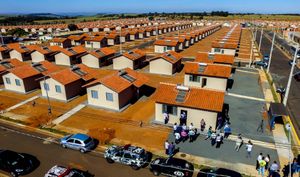Once a prominent face on Italian television, Marco Bellavia experienced the dizzying heights of fame, followed by significant lows, personal struggles, and renewed public interest. Best known for his role as the host of the popular children’s program Bim Bum Bam during the 1990s, Bellavia’s life has now become as complex as his contrived career.
Born in Milan in 1964, Bellavia became one of the most beloved figures on the small screen, captivating audiences with his charm and flair. After years of lesser roles, his major breakthrough came when he became the face of Bim Bum Bam, hosting it until 2001. His vibrant on-screen personality made him extremely popular among young viewers, leading him to solidify his place as one of Italy's foremost television personalities.
Despite his vastly successful career during the 90s, Bellavia faced unforeseen struggles, leading him to step back from the limelight. After shifting to lesser-known networks and even starting his advertising agency, he grappled with unanswered questions about why his career had taken such a downturn. “I have asked myself millions of questions. I wondered why I had stopped and had done so from 2001 until just before Grande Fratello,” he expressed during his candid appearance on Verissimo. This period of introspection coincided with him battling personal demons, primarily depression.
His return to reality TV on Grande Fratello Vip serves as both his comeback and downfall. During his time there, he faced debilitating mental health issues, subjected to bullying by co-stars, deteriorated mental well-being, and even public humiliation. “When I entered the house, I was completely unprepared. Perhaps because I was psychologically vulnerable,” said Bellavia. This troubling period opened floodgates for public discussions on mental health, something he felt was stigmatized years earlier.
His experiences on the show were starkly contrasted by the air of confidence he held during the peak of his fame, especially considering his high-profile relationships. His romance with popular TV presenter Paola Barale became one of the early highlights of his personal life. They dated from 1992 to 1995, and their youthful love story was heavily spotlighted. According to Toscano, Barale played a pivotal role during Bellavia’s tumultuous post-Grande Fratello period, helping boost his morale: "She was wonderful. She instilled courage and warmth toward him," reflecting on how important her support was for him.
Despite later claiming they were young and not ready for long-term commitment, Bellavia often reminisces fondly about those days: “We were young and beautiful, but we had to live our experiences,” he reminisced. Curiously, tales of their engagement surfaced, with Bellavia gifting Barale with a diamond ring, and she giving him a motorcycle. Yet, like many youthful romances, their relationship came to an end, exemplifying how fleeting fame can be.
Years later, Bellavia married Elena Travaglia, with whom he had one son, Filippo. Though Elena is less publicly known, she stepped up during tough times, defending him against public scrutiny. “Marco is a good person, perhaps too sensitive but has often sought help,” she stated, emphasizing her support during his realities of living with mental health challenges. Despite their eventual separation, they maintain a strong co-parenting relationship for their son.
Another significant relationship was with Maryanna Bosis, with whom his connection sprouted after his initial marriage. Their relationship reignited interest, predominantly through Bosis’s candid comments on Bellavia’s motivations and struggles during his TV appearances, which painted him under scrutiny and led to public speculation about his mental health condition. She commented, “Marco? He exploited the situation... this isn't the behavior of someone who is emotionally distraught,” sparking controversy about his time on reality TV.
Bellavia has since transitioned to leveraging his platform, using social media to share his experiences, promote mental health awareness, and engage with his followers closely. His Instagram boosts insights to his current endeavors, including the publishing of content like his book titled Depressio? Qui e ora, which explores his struggles with depression and the societal stigma around it. He remains committed to not only advocating his narrative but supporting those who resonate with his stories.
Overall, Marco Bellavia’s life reads much like his tumultuous career—a narrative of high-flying fame turned frail by personal and emotional battles, now taking steps toward empowerment and recovery. His tale of resilience amid adversity speaks volumes about the delicacy surrounding fame, relationships, and mental health, urging us to extend compassion and recognition.”



